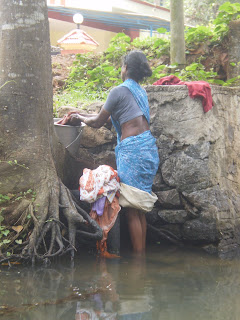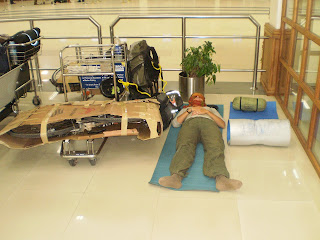 |
| water buffalo with really long horns |
Dear Readers, friends and families,
 |
| Mumbai train station |
time passes as we travel further south in India. Our last post is from Rajasthan. Because of our short visa ("only" two months) we decided to take a train to the south to continue cycling there. First we wanted to go to Hampi. It should be a marvelous place in the state of Karnataka. But as there where no simple connections from Udaipur we decided to go to Goa first and see what's happening then.
They have a crazy system here in India: if you want to book at the station you have to hand in a paper with all the trains numbers, departure time and so on. Don't know how you are supposed to find out all this data. But fortunately there is one counter for disabled, blind, veterans...and, guess what: foreigners! After some time at the train station and several attempts to book a ticket at this counter, we found a trip with only one change at Mumbai. "Wow, that's cool" we thought. Well, that was before we where in the train and found our that we did not only have to change trains in Mumbai, India's biggest city with 20 Million inhabitants, but also train stations! This meant a trip trough all the whole city of Mumbai with the bikes, all our luggage and the traffic. Ooops.
 |
| In the rice paddies |
To make a long story short: we made it and it wasn't all that bad after all. And we arrived happily and after some good sleep in Goa. There we decided that we are actually cyclists and wanted to cycle again and not wait for the train to Hampi two days after. We will see this place next time.
 |
| Celebrating the hindu "holi" festival on the way to Karnataka |
Therefore it was time for some beach hopping, swimming and sunbathing. Goa is a small state in India (once a Portoguese colony) and was one of the last ones to join the independent India after the collapse of the Portuguese dictatorship of Salazar in the middle sixties. The famous party-scene on electronicmusic-, light drugs- and LSD-basis is concentrated in small spots on the north of the state. Disappointingly we arrived by train in the south, where heavy-drinking British pensioners and new Russian middle-class make up the core of the touristic bulk. Our will to get stoned was less pressing than the will of avoiding the cycle trip to the north to cycle south again, so we decided to take he best of the south part of the state. We spent good time on some of India's finest beaches like Benaulim or Palolem with marvelous fish dinners on the sand at a price of a bargain and enjoyed the cycling between green rice plantations. Then we moved south to the state of Karnataka to the even better beaches like Kuddle beach, Om beach, Paradise beach near Gokarna.....Yes, it was nice. But it was a bit strange to be afraid of sunburn and having to put on sun blocker. But after 4 months in the fresh air and under the sun, all but our arms and legs is still quite white: typical cyclist-tanned skin!




Maybe we repeat ourselves, but it was interesting to see how different India can be. If you only know Rajasthan, you wouldn't believe something like Goa can exist in the same country - and the other way round. In Goa colonial influence is still very present with a lot of christian churches (the majority here is christian) and the women wear dresses and no Saris. Some of the younger ones would even show their knees: really vicious! The taxes on Alchool are much lower than in the north, making the prices up to 70% lower. For us European it is strange to associate transgression with Catholicism and Christianity. In our cities often the most "transgressive" suburbs are associated with Islamic immigration, and if you want some weed, often the dealers comes from north-africa or other Mediterranean countries. Here is the other way round! We noticed the same also in Iran in the city of Esfahan, where the local youth got smuggled alcohol and hashish from Afghanistan in the Christian suburb of Jolfa. So guys, In Asia Christianity rocks, and the pope smokes dope!
 |
| For Natalie - even nature loves Schnoerkel! |
Changing theme, we would like to asses one of the first peculiarity of a country that at first should impress a cycling tourist: How the locals deal with road traffic?
India is an exotic touristic destinations for many travellers and it is easy to identify with it, at least to some extent, the typical post-hippy-left-minded-shanty-peace&love white people hanging around everywhere in the subcontinent who fall in love with the country (or their imagination of it...). Despite of that, India has since millennia one of the most racists and most terrific social system ever created by human beings: the cast system. It is coherent and inherent to the dominating Hindu religion but influences also the other vast minorites. The cast system has been officially abolished, but in practice little has changed. Without entering in the details of such a complex thema Matteo is of the opinion the religious and social background heavily influences the attitude of the indians on the roads. Indeed, the traffic system is strictly hierarchic too. On the top of the pyramide there is the cow. The incontestable king (or better queen) of the roads make its existence on every surface of a city or of a road which it elects as its place. It is a common scene to see many Indians on a huge variety of vehicles (often with a huge number of Indians on them) that until a minute before had fight almost to death for every available square centimeter of road, waiting patiently and quiet for a cow. The cow stays in the middle, maybe taking a shit or making the road full of piss and then, but only if it wants, will abandon its position to allow the others to carry on on their way, ignoring them and staring at the world with the its typic odd and stupid expression.
 |
| milking cows in front of our hotel |
Below the cow, the rest of the person and animals taking part to the road traffic rules itself also hierarchically: by dimensions. Dimension is the real key to interpret the traffic here, and the acceptance of the fact that a bicycle count much less than a truck, is of vital importance on Indian roads. The unification of this simple rule with the general attitude of the Indians to cheat and to come better off, lead to the other major characteristic of the Indian traffic: a wild honking. Every vehicle tries to gain importance and hike the stairs of the hierarchy by cheating on its dimensions by a louder honking than its competitors. Surprisingly, the public transports buses, which by rule of dimension should be already almost on the top, have a private fight with the trucks, and mount the most powerful and loud honking systems on earth. It is something you cannot imagine how loud they are. The serie-honking systems on Indian vehicles are much louder than in Europe, and many mechanics offer to tune them even louder. It's common to find piaggio Ape which honks as loud as a complete drunken brass-band. This is not the exaggeration of an European tourist who wants to sound cool or to be funny. It is really so, and it is hardly funny. Of course in some cities it's worse than in others (To our experience Jaipur is the worst) but on average it's almost the same everywhere. The problem is that this wild honking system has already come to a saturation. Actually, if you imagine a Cartesian system where on the X axis you put the frequency and loudness of the honking and on the Y axis the effect you obtain on the other people, the curve you get is a parabolic curve with the alfa therm < 0. That is, the effect the street competitors will steadily increase with the increase in the honking up to a maximum to decrease as steadily if you increase the honking further. Paradoxically here there is such a wild and constant honking that nobody cares that much about it. This is a common effect (I am thinking about the Italian politics and its language for instance). It bears for sure the name of some mathematician or sociologist that described it. I am not sure that it can be represented with a parable but I hope you got the principle (and if you want you can discuss it by posting a comment).
Once you get this simply rules, to cycle in India it is really enjoable and so far surprisingly easy. Nothing to do with the horror that a German cyclist described at one party in Munich. To him to cycle here was simply impossible and he gave up after few days. Either he was just a German or Mascha and me are becoming just too tough. But overall, India is just beautiful.
 |
| Public viewing for the Cricket final: India is world champion! |
 |
| Matteo in the Mysore Palace |


























